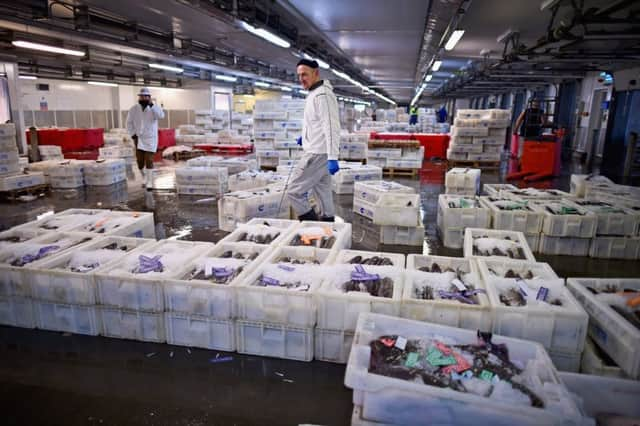Brexit disruption could see exports '˜left to rot' as lorries queue at ports


The warning came as hauliers claim that the agency’s ambition to double Scotland’s food and drink sector to £30 billion by 2030 will be wrecked by leaving the EU, predicting that the country will shut down – just as it did in the fuel crisis of 2000.
The Scottish Road Haulage Group (SRHG), which represents more than 50 businesses, warns that Brexit will result in a exodus of foreign drivers and massive queues at ports like Hull and Dover, which are used by Scottish-based drivers.
Advertisement
Hide AdAdvertisement
Hide AdThis week SRHG representatives will meet the Scottish Government to voice their concerns and ask ministers to do more to combat the driver shortage that they believe will bring the country to a standstill.
The SRHG’s Geoff Campbell told Scotland on Sunday that Brexit will have an enormous impact on ambitious plans to grow Scotland’s food and drink industry.
Scotland Food and Drink, the Scottish Government-supported non-profit organisation devoted to growing the sector, has set out its Ambition 2030 strategy which aims to double the value of the sector to £30 billion.
But Campbell said the logistical challenge of moving food freight in and out of the UK would put the target out of reach.
“I think anybody looking for massive expansion like that which relies on road haulage – and there’s not many that don’t – should really take this problem very seriously,” said Campbell.
“I think those targets are unrealistic unless they’ve got some spaceships to transport their stuff.”
Withers acknowledged Brexit would cause “major disruption” which would destroy perishable products, like shellfish, which are crucial to Scotland’s reputation as an exporter of quality food.
“Last year, we sold £1.5bn of Scottish food internationally. Over £1bn of that, nearly 70 per cent, went to Europe and almost all of it goes by land and sea. Disruption to haulage routes, either by a shortage of drivers or delays at ports of entry, could cause major disruption,” said Withers.
Advertisement
Hide AdAdvertisement
Hide Ad“A lot of food transport to the Continent has a short shelf life. Products like shellfish can be destroyed by delays. Even products with years of shelf life, like Scotch whisky, have extremely tight delivery windows.”
Withers said “warning shots” had already been fired, pointing out that the closure of the Channel Tunnel in 2015 turned the M20 into a vast carpark.
“It showed how quickly even minor disruption can cause major distribution problems”.
Campbell warned Scotland was heading for a scale of disruption on the roads not seen since the fuel crisis of 2000 when protests over fuel price rises saw farmers and lorry drivers blockade oil refineries.
For just over a week the country was paralysed, petrol forecourts ran dry and supermarket shelves were emptied.
This time around, however, Campbell predicted that the disruption would be caused by massive queues at customs as lorries laden with exports and imports tried to cope with the extra bureaucracy associated with leaving the customs union.
He added that supply chains would be broken, devastating companies relying on exports while difficulties importing food would lead to shortages in supermarkets.
Hauliers would struggle to run their businesses deprived of thousands of eastern European drivers driven out of Scotland by the end of free movement of labour and a weakening pound.
Advertisement
Hide AdAdvertisement
Hide AdThe SRHG estimates that of a Scottish workforce of around 38,000 Scottish lorry and van drivers, around 4,500 are foreign.
“From an import/export perspective we’ve got to get products on sea and air freight, but there is always a road journey involved,” said Campbell. “If we can’t get the products in and out there is going to be a serious breakdown. Road transport is essential for almost every sector.
“Look at the fuel crisis back in 2000: the whole country shut down. There just seems to be no thoughts on planning for it. The Scottish Government should be planning for this, so should the UK Government.”
The mounting concern about the threat of Brexit to hauliers was raised last week with UK immigration minister Caroline Nokes by the UK-wide Road Haulage Association (RHA).
Martin Reid, a Scottish- based director of the RHA, said: “Eastern European workers have been underpinning this industry. Now there is the potential for the need for work permits and the weakening pound mean that it is not such an attractive proposition to work here.”
A Scottish Government spokesperson said: “We value the contributions EU citizens and their families make to our economy and society, and we will do all we can to support them through this difficult time. It is increasingly clear the UK government’s immigration policy does not address Scotland’s economic, demographic and social needs. The case is overwhelming for the Scottish Government to be able to set the rules for migration tailored to the needs of Scotland.”
A UK Government spokesperson said: “Our proposal for a Facilitated Customs Arrangement, as set out in the White Paper, would avoid any new routine checks and controls between the UK and the EU, ensuring trade is as frictionless as possible.
“EU citizens make a huge contribution to our economy and to our society and we have been clear that we want these citizens and their families to be able to stay. The EU Settlement Scheme will make it easy for EU citizens to get the status they need. It will be opened from later this year.”